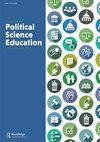评估实习项目的设计和效益
IF 0.6
Q3 POLITICAL SCIENCE
引用次数: 2
摘要
摘要奖学金对大学生专业发展机会的作用凸显了实习项目日益重要的意义。随着实习项目的数量激增,出现了不同的实习项目设计。实习项目在关键方面各不相同,包括学术内容的整合、实习产品的开发(公开与专门设计的实习)和实习(自选与指导)。本文比较了研究型大学的三种实习模式:一种涉及一系列政治学相关实习的“传统”模式;以研究为重点的政治学实习项目;以及一个侧重于环境科学、政策和教育实习的环境实习项目。本文通过考察组织和过程变量、实习对参与者的影响以及参与者满意度来评估和比较这些项目。我们采用定性和定量相结合的方法,包括对三个项目的参与者进行专门设计的意见调查。研究结果表明,当某些元素被整合到实习项目中时,具有不同资源的不同模式的实习项目都可以提供高影响力和高满意度。那些被赋予更具挑战性的任务和主动行动的机会的学生尤其有可能获得各种个人、职业和公民利益。总体而言,参与者的满意度最高,他们认为实习给了他们新的知识和技能,改善了他们的就业前景,丰富了大学经历,并为一项重要事业做出了贡献。本文章由计算机程序翻译,如有差异,请以英文原文为准。
Evaluating the Design and Benefits of Internship Programs
Abstract Scholarship on the role of professional development opportunities for undergraduate students has highlighted the growing importance of internship programs. Different designs of internship programs have emerged as their numbers proliferate. Internship programs vary on key dimensions including integration of academic content, development of internship offerings (publicly available vs. specially designed internships), and placement (self-select vs. guided). This paper compares three models of internship programs in a research university: a “traditional” model involving an array of political science–related internships; a research-focused internship program in political science; and an environmental internship program focused on environmental science, policy, and education internships. The paper evaluates and compares these programs by examining organizational and process variables, the impact of internships on participants, and participant satisfaction. We use a combination of qualitative and quantitative methods, including a specially designed opinion survey of participants in the three programs. The results demonstrate that different models of internship programs with varying resources can all provide high impact and high satisfaction levels when certain elements are integrated into the programs. Students who were given more challenging tasks and opportunities to take initiatives were especially likely to gain a variety of personal, professional, and civic benefits. Overall, the highest levels of satisfaction were expressed by participants who felt their internship gave them new knowledge and skills, improved their employment prospects, enriched the college experience, and contributed to an important cause.
求助全文
通过发布文献求助,成功后即可免费获取论文全文。
去求助
来源期刊

Journal of Political Science Education
POLITICAL SCIENCE-
CiteScore
1.80
自引率
36.40%
发文量
69
期刊介绍:
The Journal of Political Science Education is an intellectually rigorous, path-breaking, agenda-setting journal that publishes the highest quality scholarship on teaching and pedagogical issues in political science. The journal aims to represent the full range of questions, issues and approaches regarding political science education, including teaching-related issues, methods and techniques, learning/teaching activities and devices, educational assessment in political science, graduate education, and curriculum development. In particular, the journal''s Editors welcome studies that reflect the scholarship of teaching and learning, or works that would be informative and/or of practical use to the readers of the Journal of Political Science Education , and address topics in an empirical way, making use of the techniques that political scientists use in their own substantive research.
 求助内容:
求助内容: 应助结果提醒方式:
应助结果提醒方式:


